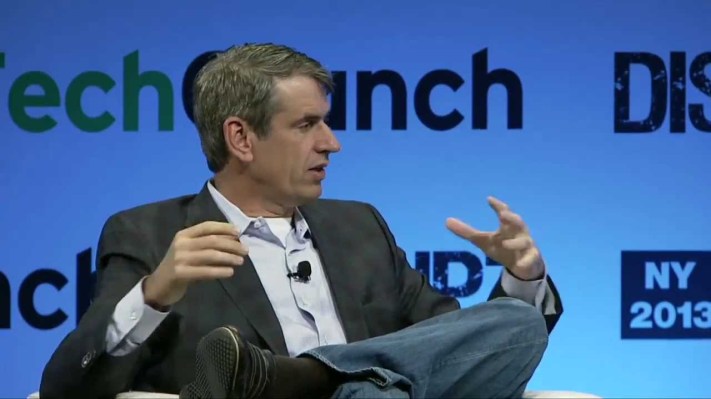Today, at an interview sponsored by the Benchmark-portfolio company Sailthru, legendary VC Bill Gurley appeared on stage with Bloomberg reporter Emily Chang to discuss the future of e-commerce.
Gurley spent much of the talk addressing the importance of personalization and the opportunity that companies miss when they focus on acquiring new customers rather than optimizing their services for current users. (Sailthru sells personalized marketing technology to its customers.)
But Gurley also talked at length about a few well-known companies, and he didn’t hold any punches when it came to sharing those about which he’s somewhat pessimistic. Among those at risk, in Gurley’s view, are the search giant Google, as well as high-flying startups Instacart, Shyp, and Postmates. (Notably, the last three compete with one of Benchmark’s most promising portfolio companies: Uber.)
Below is part of this morning’s conversation, edited for length.
On whether Google is at an inflection point:
Here, Gurley evoked a “reversal of funnel” concept, saying that for nearly two decades Google has enjoyed a perch at the top, where “you do the least amount of work” and the money is easy. Meanwhile, lower in this metaphorical funnel — where you see the “nitty gritty, the hard work, the touching of physical goods,” he said — Amazon has been clawing its way upward with every transaction that solidifies its consumers’ trust in its pricing and its ability to deliver when it says it will.
The end result is that now, when the tens of millions of people who subscribe to Amazon’s Prime service go online, they “first search with Amazon Prime checked, then Prime unchecked, and then, if that doesn’t work, [they] go to Google,” said Gurley, likening it to the “search of last resort.”
That means two things for Google, Gurley said. First, and most plainly, Amazon now threatens a much broader section of Google’s search traffic, which is e-commerce. Amazon and others have Google playing catch up, too, including through products like Google Express, which Gurley views as a “chaotic response” to the challenge. “It’s not set up in a logistically optimal way. I think it’s defensive, rather than offensive. And I don’t think big companies do well with defensive strategies.”
On the future of the grocery-delivery Instacart, valued at $2 billion way back in January:
“I’m not sure how many people need that degree of care,” he told the small crowd of attendees. “My wife loves Instacart,” he continued. Then again, he said, “Everyone loved [the dot.com grocery delivery company] Webvan until it went out of business.”
“It’s like the old adage, [when you’re] handing out dollars for 85 cents, you can go [infinitely],” he said. “Chosen unicorns are being given hundreds of millions of dollars, but you have to ask how much margin is there. The unit economics [with Instacart] would be very difficult, I’d think.”
“Going back to the Google Express,” Gurley went on, “I have a hard time thinking it’s optimal for [Proctor & Gamble] to sell to Walgreen’s distribution center, where [its goods are] offloaded, [after which] a guy with a box cutter puts it on a shelf, all to have some employee from another company take it off the shelf and take it to your house.”
Asked if he thinks Instacart could be the next Webvan, Gurley shrugged. “You’re implying bankruptcy, so I don’t know. I don’t have enough knowledge. I do know it’s not a question of whether people like [the product]. It’s a question of whether you can generate enough cash flow from that type of operation.”
On Shyp, Postmates, and other newer delivery services that, again, compete with Benchmark-backed Uber, which aims to increasingly make deliveries a part of its business:
“One thing that happens in Silicon Valley – and this has been highly cyclical – the more we get into peak-y [valuations] territory, the more optimistic we get about business models that are lower margin,” said Gurley.
“It’s like, the last time,” he went on. “All this Postmates and Shyp stuff happened [in] ’99, with [the failed online delivery startup] Kozmo, [and] it’s the same shit. It’s the same shit. The smart phone helps a little bit. You have more data. But we’ll see. The question for all of those things has to do with core economics that’ll be proven out over time.”
As for where e-commerce startups would be smart to compete:
Two words, said Gurley: “Anxiety relief. Humans love it when you remove [anxiety].”
“When [Uber CEO] Travis [Kalanick] started Uber, he insisted there not be a [option for a tip built into the app]. He didn’t want the user experience to include this anxious moment of, ‘What should [the tip] be?'”
OpenTable, the now publicly traded company that Benchmark backed earlier on, also tackled anxiety head on, said Gurley. “You push a button. You don’t have to call and ask if [a restaurant] has a table for six.”
Of course, Gurley suggested, consumer trust takes time to win. “[With] some vendors,” he noted, laughing, “you get that tracking number and you keep it by your keyboard because you’re not sure [what you purchased] is going to make it there.”
Startups that want to succeed should be thinking: “Where are opportunities to remove that [doubt] for the customer?”
